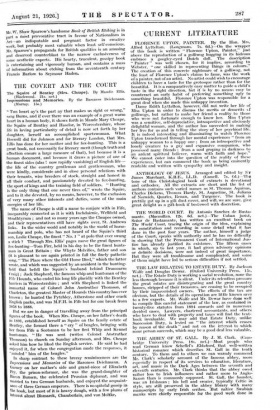THE COVERT AND THE COURT
The Squire of Bentley (Mrs. Cheape). By Maudie Ellis. (Blackwood. 21s. net.) Impressions and Memories. By the Baroness Deiehmann. (Murray. 15s.)
"Tax heart ay's the part ay that makes us right or wrang," sang Burns, and if ever there was an example of a great warm heart in a human body, it shows forth in Maude Mary Cheape, the Squire of Bentley and Haselor, in Worcestershire, whose life in loving particularity of detail is now set forth by her daughter, herself an accomplished sportswoman. What Boswell did for Johnson and for literary London, that Mrs. Ellis has done for her mother and for fox-hunting. This is a great book, not necessarily for literary merit (though truth and affection ensure a large measure of that), but because it is a human document, and because it draws a picture of one of the finest sides (alas ! now rapidly vanishing) of English life— the life of the country gentleman and gentlewoman, who were kindly, considerate and in close personal relations with their tenants, wise breeders of stock, straight and honest in all their conduct, and passionately devoted to fox-hunting, the sport of kings and the training field of soldiers. "Hunting is the only thing that one never tires of," wrote the Squire, and to it she devoted, by no means, however, to the exclusion of very many other interests and duties, some of the main energies of her life.
The name of Cheape is still a name to conjure with in Fife, inseparably connected as it is with Inchdairnie, Wellfield and Strathtyrum ; and not so many years ago the Cheapes owned, and their representatives still have rights 'over, St. Andrews links. In the wider world and notably in the world of horse- manship and polo, who has not heard of the Squire's third son, Leslie Cheape, the finest " No. 1 "at polo that ever swung a stick ? Through Mrs. Ellis' pages move the great figures of fox-hunting—Tom Firr, held in his day to be the finest hunts- man in Great Britain ; the Whyte Melvilles, father and son (it is pleasant to see again printed in full the finely pathetic song, "The Place where the Old Horse Died," which the latter wrote, and which was suggested by an accident in the hunting- field that befell the Squire's husband behind Drumcarro Craig) ; Jack Shepherd, the famous whip and huntsman of the Fife Hounds, who ended his long life placidly with the Bentley harriers in Worcestershire ; and with Shepherd is linked the immortal name of Colonel John Anstruther Thomson, of Charleton, the greatest Master of Hounds this country has ever known ; he hunted the Pytchley, Atherstone and other crack English packs, and was M.F.H. in Fife but for one break from 1858 to 1888.
But we are in danger of travelling away from the principal figures of the book. When Mrs. Cheape, on her father's death in 1891, established herself as Squire on the family estate of Bentley, she formed there a " cry " of beagles, bringing with her from Fife a Scotsman to be her first Whip and Kennel huntsman. "He was sent (writes Colonel Anstruther Thomson). to church on Sunday afternoon, and Mrs. Cheape asked him how he liked the English service. He said he had enjoyed it, for when the congregation made the responses, it '
minded' him of the beagles."
In sharp contrast to these breezy reminiscences are the Impressions and Memories of the Baroness Deichmann. A Gurney on her mother's side and grand-niece of Elizabeth Pry, the prison-reformer, she was the grand-daughter of Baron Bunsen, the celebrated Prussian diplomat, and was married to two German husbands, and enjoyed the acquaint- ance of three German emperors. There is no spiteful gossip in the book, but most of it is heavy dough, with a few plums of interest about Bismarck, Chamberlain, and von Moltke.


































 Previous page
Previous page